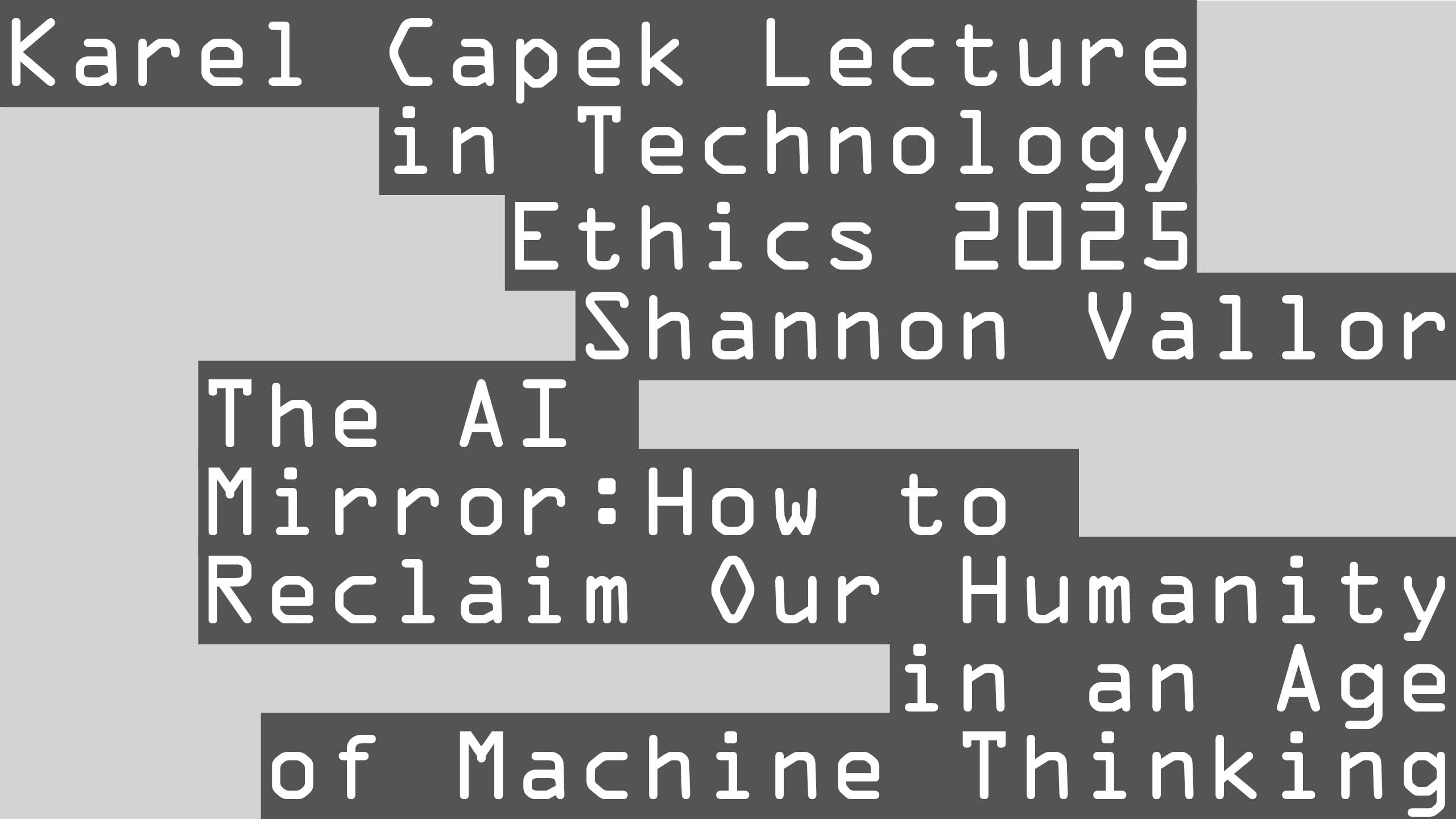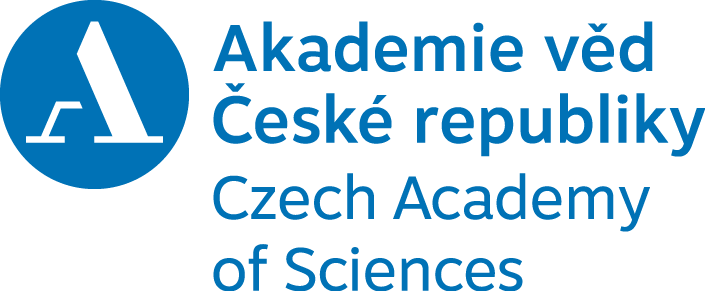
Free entry
CETE-P is launching a new signature annual event in technology ethics, bringing to Prague some of the most prominent philosophers of technology and AI ethics from around the world. Each year, a distinguished speaker will deliver a keynote address engaging with pressing ethical questions at the intersection of technological innovation, society, and human values.
The aim of Karel Čapek Public Lecture Series in Technology Ethics is to create a long-running tradition that not only showcases leading research but also stimulates public discussion and academic collaboration in this rapidly evolving field.
In 2025, we are honored to host Prof. Shannon Vallor and her talk The AI Mirror: How to Reclaim Our Humanity in an Age of Machine Thinking.
Beginning with the example of the generative AI chatbot, this talk demystifies the gap between AI tools and human minds, by explaining the difference between a mirror image and the reality it reflects. Using the mirror metaphor developed in Shannon Vallor's most recent book The AI Mirror, the talk outlines how the reflective capacity of AI tools explains both their power and their perils. A key focus of the talk is the inherently conservative and thought-narrowing nature of these tools. It is well-documented that AI mirrors regenerate the most common patterns of injustice and shortsighted decision-making found in our historical data. When we use them to offload our own thinking, writing, valuing, and acting, we push our past failures into our future, and suppress our ability to imagine newer and better ways of living and flourishing together.
Without a profound transformation in how we talk about innovation, and how we expect our elected leaders to govern the commercial powers and incentives driving today's increasingly reckless AI race, we will increasingly rely on mindless machines that only recycle the same flawed policies and habits of the past that led us into unsustainable forms of life. The talk ends by reflecting on how we can reclaim our shared humanity, agency and possibilities from the AI mirror illusion, as we stand on the brink of a future that urgently commands our power to change.
Prof. Shannon Vallor is the Baillie Gifford Chair in the Ethics of Data and Artificial Intelligence at the Edinburgh Futures Institute (EFI) at the University of Edinburgh, where she is also appointed in Philosophy. She is Director of the Centre for Technomoral Futures in EFI, and co-Director of the BRAID (Bridging Responsible AI Divides) programme, funded by the Arts and Humanities Research Council. Professor Vallor's research explores how new technologies, especially AI, robotics, and data science, reshape human moral character, habits, and practices. Her work includes advising policymakers and industry on the ethical design and use of AI. She is a standing member of the One Hundred Year Study of Artificial Intelligence (AI100) and a member of the Oversight Board of the Ada Lovelace Institute. Professor Vallor received the 2015 World Technology Award in Ethics from the World Technology Network and the 2022 Covey Award from the International Association of Computing and Philosophy. She is a former Visiting Researcher and AI Ethicist at Google. In addition to her many articles and published educational modules on the ethics of data, robotics, and artificial intelligence, she is the author of the book Technology and the Virtues: A Philosophical Guide to a Future Worth Wanting (Oxford University Press, 2016) and The AI Mirror: Reclaiming Our Humanity in an Age of Machine Thinking (Oxford University Press, 2024).
Funded by Strategy AV 21 (Czech Academy of Sciences, Akademie věd České republiky) and CEVAST (Karel Čapek Center for Values in Science and Technology).




Free entry
CETE-P is launching a new signature annual event in technology ethics, bringing to Prague some of the most prominent philosophers of technology and AI ethics from around the world. Each year, a distinguished speaker will deliver a keynote address engaging with pressing ethical questions at the intersection of technological innovation, society, and human values.
The aim of Karel Čapek Public Lecture Series in Technology Ethics is to create a long-running tradition that not only showcases leading research but also stimulates public discussion and academic collaboration in this rapidly evolving field.
In 2025, we are honored to host Prof. Shannon Vallor and her talk The AI Mirror: How to Reclaim Our Humanity in an Age of Machine Thinking.
Beginning with the example of the generative AI chatbot, this talk demystifies the gap between AI tools and human minds, by explaining the difference between a mirror image and the reality it reflects. Using the mirror metaphor developed in Shannon Vallor's most recent book The AI Mirror, the talk outlines how the reflective capacity of AI tools explains both their power and their perils. A key focus of the talk is the inherently conservative and thought-narrowing nature of these tools. It is well-documented that AI mirrors regenerate the most common patterns of injustice and shortsighted decision-making found in our historical data. When we use them to offload our own thinking, writing, valuing, and acting, we push our past failures into our future, and suppress our ability to imagine newer and better ways of living and flourishing together.
Without a profound transformation in how we talk about innovation, and how we expect our elected leaders to govern the commercial powers and incentives driving today's increasingly reckless AI race, we will increasingly rely on mindless machines that only recycle the same flawed policies and habits of the past that led us into unsustainable forms of life. The talk ends by reflecting on how we can reclaim our shared humanity, agency and possibilities from the AI mirror illusion, as we stand on the brink of a future that urgently commands our power to change.
Prof. Shannon Vallor is the Baillie Gifford Chair in the Ethics of Data and Artificial Intelligence at the Edinburgh Futures Institute (EFI) at the University of Edinburgh, where she is also appointed in Philosophy. She is Director of the Centre for Technomoral Futures in EFI, and co-Director of the BRAID (Bridging Responsible AI Divides) programme, funded by the Arts and Humanities Research Council. Professor Vallor's research explores how new technologies, especially AI, robotics, and data science, reshape human moral character, habits, and practices. Her work includes advising policymakers and industry on the ethical design and use of AI. She is a standing member of the One Hundred Year Study of Artificial Intelligence (AI100) and a member of the Oversight Board of the Ada Lovelace Institute. Professor Vallor received the 2015 World Technology Award in Ethics from the World Technology Network and the 2022 Covey Award from the International Association of Computing and Philosophy. She is a former Visiting Researcher and AI Ethicist at Google. In addition to her many articles and published educational modules on the ethics of data, robotics, and artificial intelligence, she is the author of the book Technology and the Virtues: A Philosophical Guide to a Future Worth Wanting (Oxford University Press, 2016) and The AI Mirror: Reclaiming Our Humanity in an Age of Machine Thinking (Oxford University Press, 2024).
Funded by Strategy AV 21 (Czech Academy of Sciences, Akademie věd České republiky) and CEVAST (Karel Čapek Center for Values in Science and Technology).
Celetná 988/38
Prague 1
Czech Republic
This project receives funding from the Horizon EU Framework Programme under Grant Agreement No. 101086898. Views and opinions expressed are however those of the author(s) only and do not necessarily reflect those of the European Union or European Research Executive Agency (REA). Neither the European Union nor the granting authority can be held responsible for them.
Celetná 988/38
Prague 1
Czech Republic
This project receives funding from the Horizon EU Framework Programme under Grant Agreement No. 101086898. Views and opinions expressed are however those of the author(s) only and do not necessarily reflect those of the European Union or European Research Executive Agency (REA). Neither the European Union nor the granting authority can be held responsible for them.